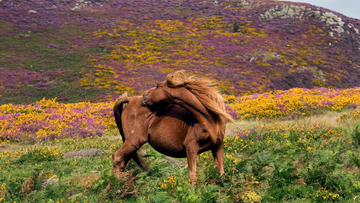Yes! Horses can suffer from allergies just like humans, and it’s important for owners to be aware of this when caring for their animals. Allergies in horses can affect various parts of the body, leading to discomfort and sometimes more severe health issues. Just like in humans, allergies in horses can be triggered by many things, including environmental elements, certain foods, or even insect bites. Being informed about these potential allergens will help you to identify symptoms early, make adjustments to the environment (if possible), and seek appropriate treatment if necessary.
Types of Allergies in Horses
There are three types of equine allergies: environmental, food, and contact allergies.
-
Environmental Triggers
-
Pollen
-
Dust
-
Mold
-
Insect Bites
-
Food Triggers
-
Certain types of grains
-
Preservatives
-
Contact Triggers
-
Blankets
-
Saddles and other tack
-
Fly sprays
-
Lotions and ointments
-
Plants
Common Allergens

An individual horse can develop allergies to almost anything in the environment. However, there are specific allergens that are more common among horses. Grass and tree pollen are common allergens for equines. You will see your horse suffering from this allergen during the spring and summer.
Horses tend to spend a lot of time in barns and stables. Poor ventilation or wet hay can lead to dust and mold, causing respiratory issues in horses. Also, horses have a lot of surface area around their bodies. While their tail does a decent job of shooing bugs away, insect bites are common on horses. Oftentimes, horses will react poorly to these bites and develop itchy, red marks.
Allergy Symptoms
The symptoms of an allergic reaction vary based on the type of allergen that triggers the reaction. Allergic reactions from allergens triggering respiratory issues will show the following symptoms:
-
Nasal discharge
-
Coughing
-
Difficulty breathing
-
Wheezing
Allergic reactions from allergens triggering skin reactions will show the following symptoms:
-
Itching
-
Hives
-
Swelling
-
Redness
Allergic reactions from allergens triggering gastrointestinal distress will show the following symptoms:
-
Colic
-
Diarrhea
-
Signs of discomfort
-
Refusal to eat or drink
How to Diagnose an Allergic Reaction
Before you can help your horse with his allergic reaction, you need to identify it. Owners who regularly examine their horses will usually notice the symptoms first. Owners should check their horse’s skin for hives, itching, and hair loss. Additionally, all coughing and nasal discharge should be recorded.
If you are unsure why your horse is suffering, call your veterinarian. She will perform an exam and ask for a detailed history to help diagnose the main issue. If a horse suffers significantly from environmental allergies, a veterinarian may suggest an allergy test. This will help pinpoint the main trigger, which will make it easier to treat.
How Do I Treat My Horse’s Allergies?
Your veterinarian will help develop a treatment plan based on your horse’s triggers. For food allergens, it is best to develop a diet that avoids the food triggers. If you are unsure what to supplement, speak with your veterinarian. For environmental allergens, horses can take antihistamines and corticosteroids just like humans. These will give quick relief and reduce any inflammation. Skin reactions are best treated with ointments that attack the primary symptoms. Ointments can help alleviate itching and inflammation on the skin.






















